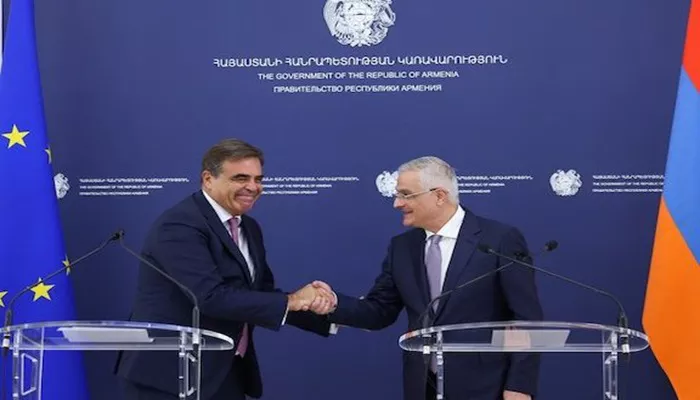Discussions on visa liberalization between the European Union (EU) and Armenia commenced on Monday in Yerevan. Vice President of the European Commission, Margaritis Schinas, and Armenia’s Deputy Prime Minister, Mher Grigoryan, led the talks.
“The objective is to reach an agreement swiftly, though the process will be complex and demanding. It will require substantial commitment from the Armenian government, alongside our support. Given the notable achievements and determination of the Armenian authorities, I am confident we will make progress quickly,” said Schinas and Grigoryan in a joint statement.
Schinas highlighted that while the political discussions have started, technical teams are working on resolving specific issues.
“This is a significant and historic day. I am pleased that Armenian lawmakers and deputy ministers are joining us for this important event. Armenia is a beacon of stability in a turbulent region. The quality of relations between the EU and Armenia shows the country’s dedication to peace and stability,” Schinas remarked.
He noted that the initiation of the visa liberalization dialogue is not an isolated event but a clear demonstration of the EU’s commitment to Armenia. Once negotiations conclude, Armenian citizens will be able to travel freely to the EU for short visits.
In addition, Schinas announced a new 270 million euro resilience and growth plan for Armenia, complementing the existing 600 million euros already invested in the country. He pointed to the EU Monitoring Mission in Armenia as evidence of EU support.
“For the first time, Armenia is receiving support for its armed forces under the Instrument for Peace. This reflects the country’s impressive democratic reforms and increased resilience,” Schinas said.
Deputy Prime Minister Grigoryan underscored Armenia’s commitment to the visa liberalization dialogue. He acknowledged that achieving the final goal will require focused efforts. Grigoryan described this process as a strategic agenda involving migration, people movement, and border management.
He affirmed that the start of this dialogue marks the beginning of efforts towards visa regime liberalization. “Armenia is dedicated to enhancing cooperation with the European Commission by implementing necessary reforms outlined in our bilateral agenda,” Grigoryan stated.
Grigoryan noted that EU-Armenian relations have never been as robust as they are now. He highlighted the addition of new components to the Armenia-EU agenda, such as political and security dialogue and the EU civilian observation mission in Armenia.
Ongoing negotiations aim to establish a more ambitious partnership agenda and resilience program, focusing on democratic reforms, cooperation expansion, and socio-economic stability. Grigoryan emphasized that the comprehensive implementation of the Comprehensive and Enhanced Partnership Agreement is a priority, with an emphasis on integrating EU best practices into Armenia’s reform agenda.
He also mentioned the importance of the Armenia-EU joint investment platform, which supports the effective execution of benchmark programs developed under the EU economic and investment plan.


